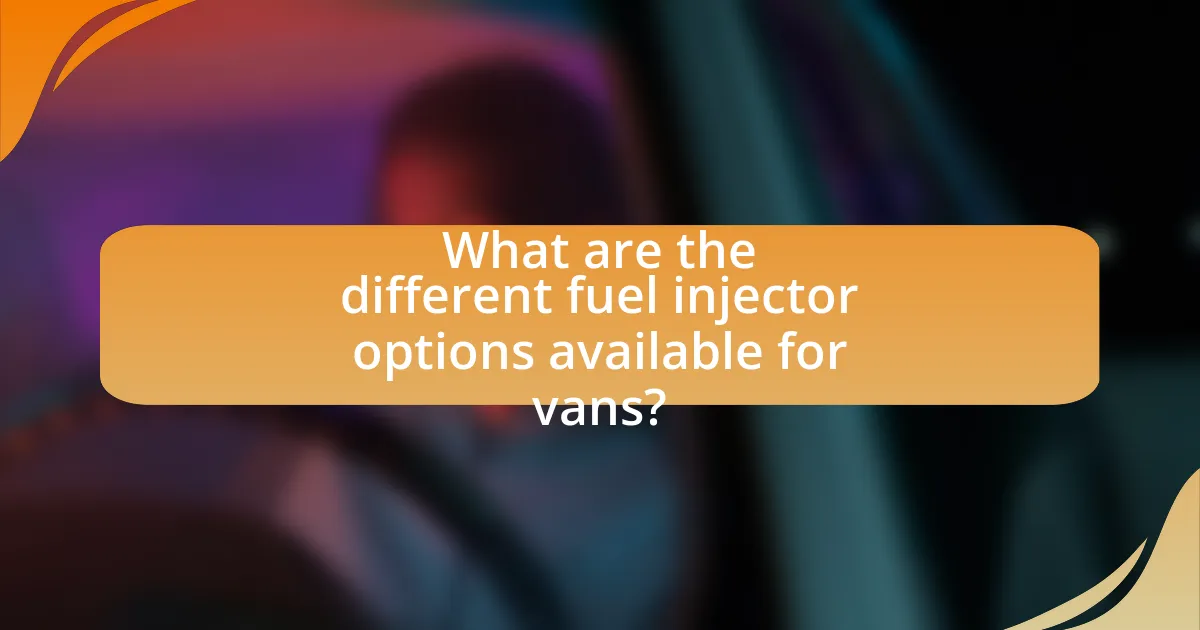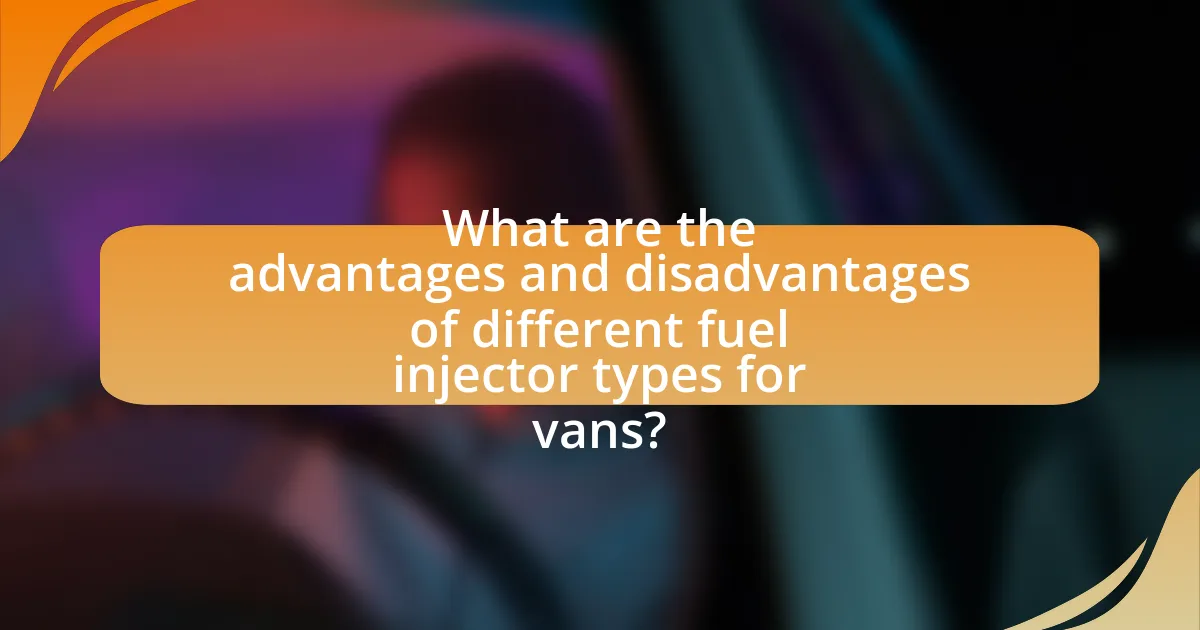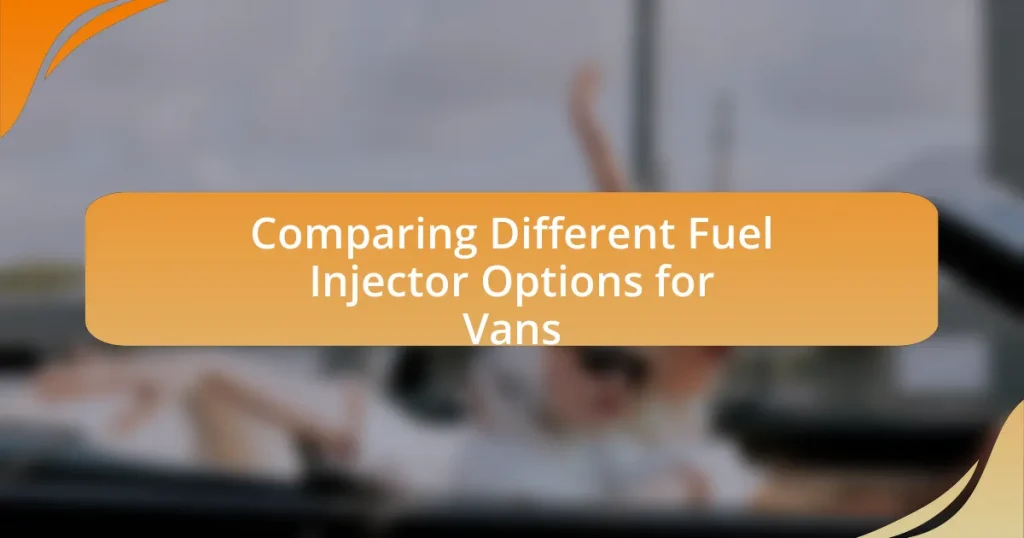The article focuses on comparing different fuel injector options available for vans, specifically highlighting port fuel injectors, direct fuel injectors, and dual fuel injectors. It explains how each type functions within a van’s engine, detailing their key components and the fuel delivery process. The article also addresses factors to consider when selecting fuel injectors, the influence of engine type on injector choice, and the advantages and disadvantages of various injector types. Additionally, it covers maintenance practices, common signs of injector problems, and tips for van owners to ensure optimal performance and longevity of their fuel injectors.

What are the different fuel injector options available for vans?
The different fuel injector options available for vans include port fuel injectors, direct fuel injectors, and dual fuel injectors. Port fuel injectors spray fuel into the intake manifold, allowing for better atomization and combustion efficiency, which is beneficial for older van models. Direct fuel injectors inject fuel directly into the combustion chamber, improving performance and fuel efficiency, commonly found in modern vans. Dual fuel injectors combine both methods, providing flexibility and optimizing performance across various driving conditions. These options cater to different engine designs and performance requirements, ensuring that van owners can select the most suitable injector type for their specific needs.
How do fuel injectors function in a van’s engine?
Fuel injectors in a van’s engine function by delivering precise amounts of fuel into the combustion chamber at the right moment. They operate using an electronic control unit (ECU) that regulates the timing and duration of fuel delivery based on various engine parameters such as speed, load, and temperature. This process ensures optimal air-fuel mixture for efficient combustion, enhancing engine performance and fuel efficiency. The injectors atomize the fuel, allowing for better mixing with air, which is crucial for effective ignition and power generation.
What are the key components of a fuel injector?
The key components of a fuel injector include the nozzle, solenoid, body, and fuel inlet. The nozzle atomizes the fuel for optimal combustion, while the solenoid controls the opening and closing of the injector, regulating fuel flow. The body houses these components and connects to the fuel rail, and the fuel inlet allows fuel to enter the injector from the fuel system. Each component plays a crucial role in ensuring efficient fuel delivery and engine performance.
How does the fuel delivery process work in vans?
The fuel delivery process in vans involves the transfer of fuel from the tank to the engine through a series of components. Initially, the fuel pump draws gasoline or diesel from the tank and sends it through fuel lines to the fuel injectors. The fuel injectors then atomize the fuel and deliver it into the engine’s combustion chamber at precise intervals, ensuring optimal combustion. This process is controlled by the engine control unit (ECU), which adjusts the fuel flow based on various parameters such as engine load and temperature. The efficiency of this process is critical for performance and fuel economy, with modern vans often utilizing electronic fuel injection systems for improved accuracy and responsiveness.
What factors should be considered when choosing fuel injectors for vans?
When choosing fuel injectors for vans, factors such as injector type, flow rate, compatibility with the engine, and quality of construction should be considered. Injector type, including port fuel injectors or direct injectors, affects performance and efficiency. Flow rate must match the engine’s requirements to ensure optimal fuel delivery; for example, a higher flow rate may be necessary for performance upgrades. Compatibility with the specific engine model is crucial to avoid installation issues and ensure proper functioning. Additionally, the quality of construction impacts durability and reliability, with reputable brands often providing better performance and longevity.
How does engine type influence fuel injector selection?
Engine type significantly influences fuel injector selection by determining the required flow rate, spray pattern, and injector design. For instance, gasoline engines typically use port fuel injection with specific flow rates suited for optimal atomization, while diesel engines require high-pressure injectors that can deliver fuel directly into the combustion chamber. Additionally, the engine’s displacement and performance characteristics dictate the injector size and type; larger or high-performance engines necessitate injectors with higher flow capacities to meet increased fuel demands. This relationship is supported by the fact that mismatched injectors can lead to poor engine performance, increased emissions, and potential engine damage.
What role does fuel injector size play in performance?
Fuel injector size significantly influences engine performance by determining the volume of fuel delivered to the combustion chamber. Larger fuel injectors can provide more fuel, which is essential for high-performance engines that require increased power output, especially under heavy loads or during acceleration. Conversely, smaller injectors may restrict fuel flow, leading to inadequate fuel supply and potential engine performance issues such as misfires or reduced power. Studies indicate that optimizing fuel injector size according to engine specifications can enhance fuel efficiency and power delivery, demonstrating the critical role of injector sizing in overall vehicle performance.

What are the advantages and disadvantages of different fuel injector types for vans?
Different fuel injector types for vans include port fuel injectors, direct fuel injectors, and dual fuel injectors, each with distinct advantages and disadvantages. Port fuel injectors offer better fuel atomization and improved throttle response, enhancing performance and efficiency, but they can lead to carbon buildup on intake valves. Direct fuel injectors provide higher efficiency and power output by injecting fuel directly into the combustion chamber, yet they are more prone to carbon deposits and require higher fuel pressure. Dual fuel injectors combine both systems, offering flexibility and improved performance, but they can be more complex and costly to maintain. Each injector type presents a trade-off between performance, efficiency, and maintenance considerations, impacting overall van operation.
What are the main types of fuel injectors available for vans?
The main types of fuel injectors available for vans are port fuel injectors, direct fuel injectors, and dual fuel injectors. Port fuel injectors spray fuel into the intake manifold, allowing for better mixing with air before entering the combustion chamber, which enhances efficiency and performance. Direct fuel injectors, on the other hand, inject fuel directly into the combustion chamber, providing more precise control over fuel delivery and improving power output and fuel efficiency. Dual fuel injectors combine both port and direct injection methods, offering flexibility and optimizing performance across different driving conditions. These distinctions are critical for understanding how each type affects engine performance and efficiency in vans.
What are the characteristics of port fuel injectors?
Port fuel injectors are characterized by their ability to spray fuel directly into the intake manifold, allowing for better atomization and mixing with air. This design enhances combustion efficiency and performance, particularly at lower engine speeds. Additionally, port fuel injectors typically feature precise control over fuel delivery, which contributes to improved fuel economy and reduced emissions. Their operation is often managed by an electronic control unit (ECU) that adjusts the timing and duration of the fuel injection based on engine conditions, ensuring optimal performance across various driving scenarios.
How do direct fuel injectors differ from port fuel injectors?
Direct fuel injectors differ from port fuel injectors primarily in their injection location and method. Direct fuel injectors spray fuel directly into the combustion chamber, allowing for more precise fuel delivery and improved combustion efficiency, while port fuel injectors deliver fuel into the intake manifold, mixing it with air before it enters the combustion chamber. This difference in injection strategy results in direct injection systems typically offering better fuel economy and reduced emissions, as evidenced by studies showing that direct injection can enhance thermal efficiency by up to 15% compared to port injection systems.
What are the pros and cons of using aftermarket fuel injectors?
Aftermarket fuel injectors offer several advantages and disadvantages. The primary pros include cost savings, as they are often cheaper than OEM injectors, and the potential for improved performance, particularly in modified engines where higher flow rates may be beneficial. Additionally, aftermarket options can provide a wider variety of specifications, allowing for customization based on specific vehicle needs.
Conversely, the cons of using aftermarket fuel injectors include the risk of lower quality and reliability compared to OEM parts, which can lead to engine performance issues or failures. Furthermore, improper installation or selection of injectors can result in poor fuel economy or increased emissions. Research indicates that while some aftermarket injectors perform well, others may not meet the same standards as original equipment, highlighting the importance of careful selection and installation.
How can aftermarket injectors enhance performance?
Aftermarket injectors can enhance performance by delivering a more precise fuel-air mixture, which improves combustion efficiency. This increased efficiency can lead to higher horsepower and torque, as well as better throttle response. For example, aftermarket injectors often have larger flow rates compared to stock injectors, allowing for more fuel to be injected when needed, especially in modified engines that require additional fuel to support increased air intake. This capability is supported by studies showing that optimized fuel delivery can result in performance gains of 10-20% in certain applications.
What potential risks are associated with aftermarket fuel injectors?
Aftermarket fuel injectors can pose several potential risks, including compatibility issues, quality variability, and performance inconsistencies. Compatibility issues arise when aftermarket injectors do not match the specifications of the vehicle’s engine, leading to improper fuel delivery and potential engine damage. Quality variability is a significant concern, as aftermarket injectors may not undergo the same rigorous testing and quality control as OEM parts, resulting in a higher likelihood of failure. Performance inconsistencies can manifest as poor fuel atomization, leading to reduced engine efficiency, increased emissions, and potential long-term damage to engine components. These risks highlight the importance of thorough research and careful selection when considering aftermarket fuel injectors for vans.

How can van owners maintain and troubleshoot fuel injectors?
Van owners can maintain and troubleshoot fuel injectors by regularly cleaning them, checking for leaks, and testing their performance. Regular cleaning can be achieved using fuel injector cleaning solutions or professional services, which help remove carbon deposits and improve fuel flow. Checking for leaks involves inspecting the injector seals and connections for any signs of fuel leakage, which can indicate a faulty injector. Testing performance can be done using a fuel pressure gauge to ensure that the injectors are delivering the correct amount of fuel under various engine conditions. These maintenance practices help ensure optimal engine performance and fuel efficiency, as clogged or malfunctioning injectors can lead to poor engine performance and increased emissions.
What are common signs of fuel injector problems in vans?
Common signs of fuel injector problems in vans include rough idling, decreased fuel efficiency, and engine misfires. Rough idling occurs when the engine runs unevenly, often due to improper fuel delivery from malfunctioning injectors. Decreased fuel efficiency is noticeable when the van consumes more fuel than usual, indicating that the injectors may be leaking or clogged. Engine misfires happen when the fuel-air mixture is disrupted, leading to a lack of power and performance issues. These symptoms are critical indicators that fuel injectors may require inspection or replacement to ensure optimal engine performance.
How can poor fuel economy indicate injector issues?
Poor fuel economy can indicate injector issues because malfunctioning fuel injectors can lead to improper fuel delivery, resulting in inefficient combustion. When fuel injectors are clogged or leaking, they may either supply too much or too little fuel to the engine, causing the vehicle to consume more fuel than necessary. Studies show that a 10% decrease in fuel injector performance can lead to a 15% increase in fuel consumption, highlighting the direct correlation between injector functionality and fuel efficiency.
What symptoms suggest a clogged or failing fuel injector?
Symptoms of a clogged or failing fuel injector include engine misfires, rough idling, decreased fuel efficiency, and poor acceleration. Engine misfires occur when the injector fails to deliver the correct amount of fuel, leading to uneven combustion. Rough idling is often a result of inconsistent fuel flow, causing the engine to run unevenly. Decreased fuel efficiency can be attributed to the injector not atomizing fuel properly, leading to incomplete combustion and increased fuel consumption. Poor acceleration indicates that the engine is not receiving the necessary fuel to respond effectively to throttle input. These symptoms are commonly observed in vehicles experiencing injector issues, highlighting the importance of maintaining fuel injectors for optimal engine performance.
What maintenance practices can extend the life of fuel injectors?
Regular maintenance practices that can extend the life of fuel injectors include using high-quality fuel, performing periodic fuel system cleaning, and ensuring proper engine tuning. High-quality fuel reduces the buildup of deposits that can clog injectors, while fuel system cleaning removes existing deposits and contaminants. Additionally, maintaining proper engine tuning ensures optimal combustion, which minimizes the risk of injector damage. According to a study by the Society of Automotive Engineers, regular cleaning and maintenance can increase injector lifespan by up to 30%.
How often should fuel injectors be cleaned or replaced?
Fuel injectors should be cleaned every 30,000 to 50,000 miles and replaced every 100,000 to 150,000 miles, depending on the vehicle and fuel quality. Regular cleaning helps maintain optimal engine performance and fuel efficiency, while timely replacement ensures reliable operation. Studies indicate that neglecting this maintenance can lead to decreased fuel economy and increased emissions, emphasizing the importance of adhering to these intervals for long-term vehicle health.
What fuel types are best for maintaining injector health?
Premium gasoline and high-quality diesel fuel are best for maintaining injector health. Premium gasoline typically contains detergents that help prevent carbon buildup in fuel injectors, while high-quality diesel fuel has additives that enhance lubrication and reduce deposits. Studies have shown that fuels with higher detergent levels can significantly improve injector cleanliness and performance, leading to better engine efficiency and longevity.
What tips should van owners follow when selecting fuel injectors?
Van owners should prioritize compatibility, performance, and quality when selecting fuel injectors. Compatibility ensures that the injectors fit the specific make and model of the van, which is crucial for optimal engine function. Performance is vital; owners should look for injectors that provide the right fuel flow rate and spray pattern to enhance engine efficiency and power. Quality is equally important; choosing injectors from reputable manufacturers can prevent issues such as clogging and premature failure. Research indicates that high-quality injectors can improve fuel economy by up to 15%, demonstrating the impact of proper selection on overall vehicle performance.



